How a small village turns a problem plant into beautiful crafts and stronger families.
Check out PRESENT SIMPLE first.
The Shinta Mani Foundation helps women in a small village. These women want a better life for their families. The Foundation gave them a loan with no interest. This means they can borrow money and pay it back later without extra cost.
The women use water hyacinth, a plant that grows too much and blocks rivers. They turn this plant into beautiful, eco-friendly bags. This helps the environment by using a plant that would be a problem.
Making and selling the bags gives the women money. They use the money to send their children to school, buy food, go to the doctor, and fix their homes. The work also helps the women stay close and support each other.
The women use traditional weaving skills. These skills come from their families and culture. The bags are strong and pretty. Many people who care about nature want to buy them.
This project helps the women and the environment. It gives the women confidence and independence. Buying these bags helps both the planet and the people.
__________________________
Vocabulary:
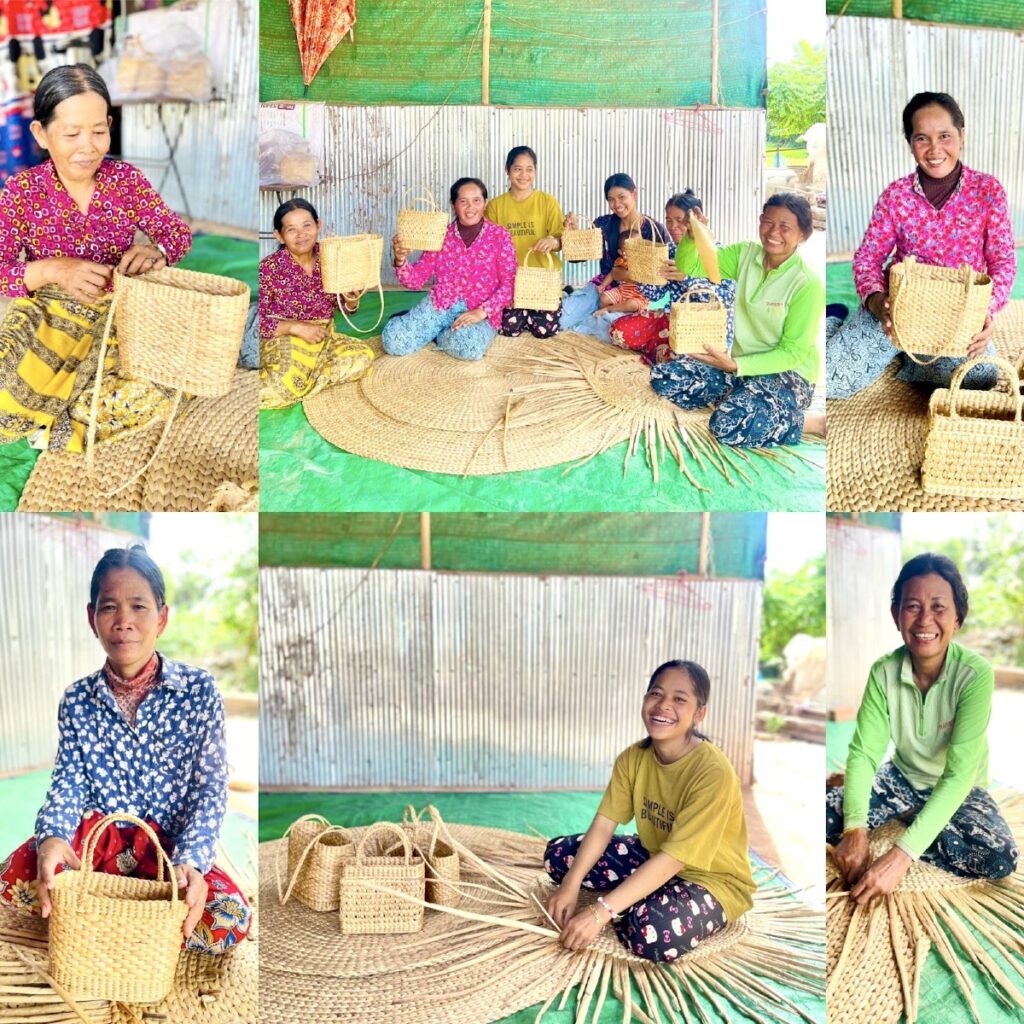
- weeds: plants that grow where people do not want them.
- a bag: something to carry things in.
- to weave: to make something by crossing threads or plants.
- a village: a small group of houses where people live.
- crafts: things made by hand, like art or useful items.
- a foundation: a group that helps people or does good work.
- a loan with no interest: money you borrow and give back without extra money.
- to borrow money: to take money and give it back later.
- extra cost: more money you have to pay.
- a water hyacinth: a plant that grows in water.
- to block rivers: to stop rivers from flowing.
- eco-friendly: good for the earth and nature.
- environment: the world around us – plants, animals, air, and water.
- to sell: to give something to someone for money.
- to fix a home: to make a house better or repair it.
- to support: to help or take care of someone.
- skills: things you can do well because you learned them.
- to care about nature: to want to protect animals, plants, and the earth.
- to give confidence: to help someone feel sure and brave.
- independence: being able to do things by yourself.
- a planet: a big round place in space, like earth where we live.
#################
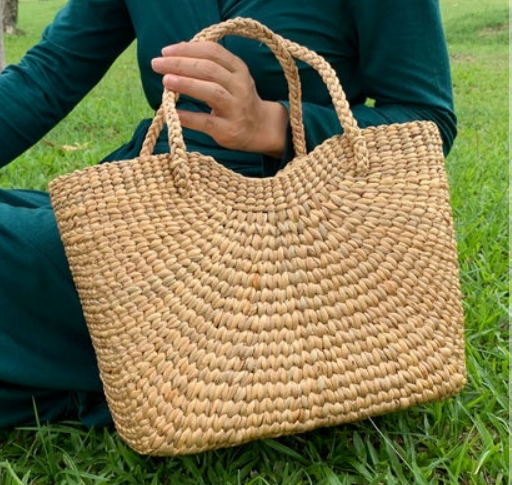
Test your vocabulary, one correct:
part 1: 1-16
part 2: 17-21
1. What does “weeds” mean?
a) plants that grow where people do not want them
b) flowers in a garden
c) trees that grow very tall
2. What is “a bag”?
a) a kind of shoe
b) something to carry things in
c) a piece of furniture
3. What does “to weave” mean?
a) to cut paper
b) to paint a picture
c) to make something by crossing threads or plants
4. What is “a village”?
a) a kind of food
b) a small group of houses where people live
c) a very big city
5. What are “crafts”?
a) things made by hand, like art or useful items
b) machines that fly
c) types of music
6. What is “a foundation”?
a) a group that helps people or does good work
b) a kind of animal
c) a type of plant
7. What is “a loan with no interest”?
a) money you find on the street
b) money you borrow and give back without extra money
c) money you get as a gift
8. What does “to borrow money” mean?
a) to lose money
b) to steal money
c) to take money and give it back later
9. What is “extra cost”?
a) more money you have to pay
b) free money
c) a discount on prices
10. What is “a water hyacinth”?
a) a kind of fish
b) a small bird
c) a plant that grows in water
11. What does “to block rivers” mean?
a) to stop rivers from flowing
b) to make rivers bigger
c) to clean rivers
12. What does “eco-friendly” mean?
a) bad for plants
b) good for the earth and nature
c) something made of plastic
13. What is “environment”?
a) a machine
b) the world around us – plants, animals, air, and water
c) a type of building
14. What does “to sell” mean?
a) to buy something
b) to give something to someone for money
c) to borrow something
15. What does “to fix a home” mean?
a) to make a house better or repair it
b) to clean a house
c) to paint a picture
16. What does “to support” mean?
a) to hurt someone
b) to help or take care of someone
c) to run very fast
17. What are “skills”?
a) foods you eat
b) things you can do well because you learned them
c) toys you play with
18. What does “to care about nature” mean?
a) to break trees
b) to want to protect animals, plants, and the earth
c) to ignore plants and animals
19. What does “to give confidence” mean?
a) to tell someone a secret
b) to help someone feel sure and brave
c) to make someone sad
20. What is “independence”?
a) being able to do things by yourself
b) needing help all the time
c) working with others
21. What is “a planet”?
a) a type of cloud
b) a big round place in space, like earth where we live
c) a kind of star
_______________________
Answer key:
1 a, 2 b, 3 c, 4 b, 5 a, 6 a, 7 b, 8 c, 9 a, 10 c, 11 a, 12 b, 13 b, 14 b, 15 a, 16 b, 17 b, 18 b, 19 b, 20 a, 21 b
#################
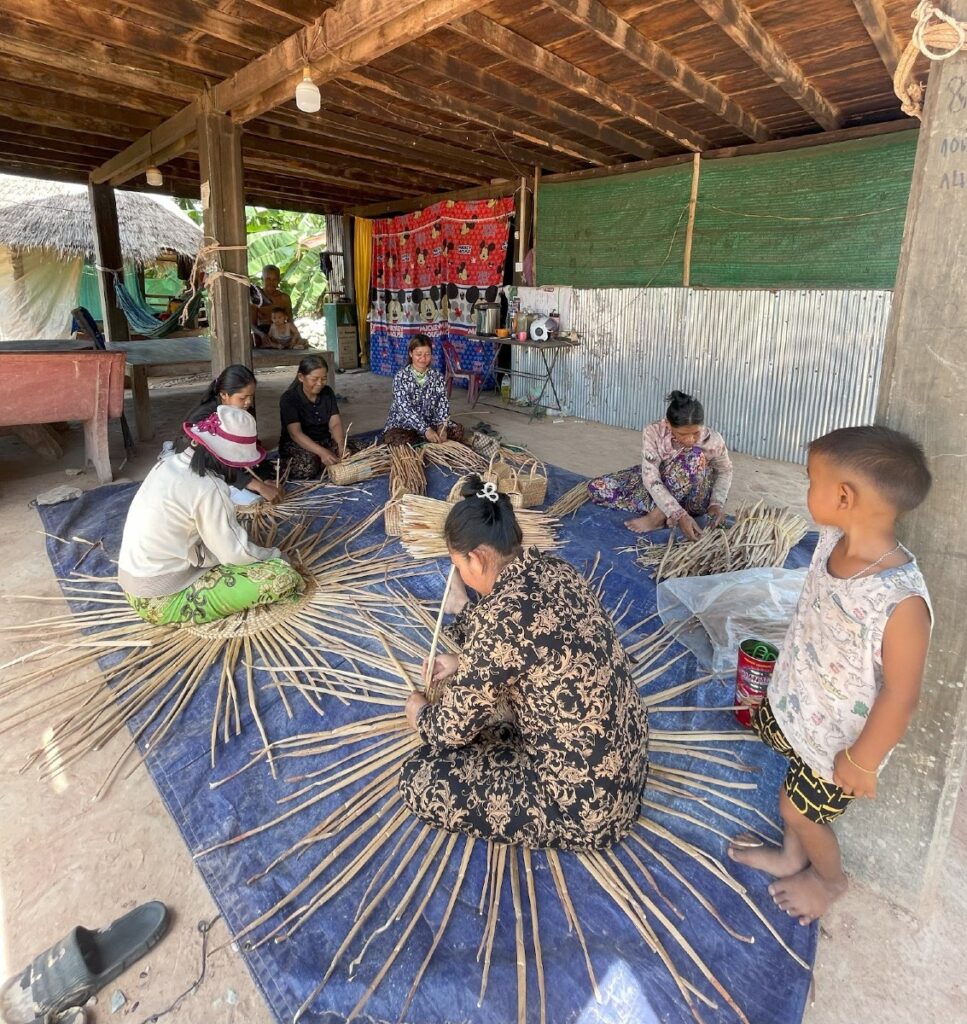
Match the definitions to their respective words:
Definitions
- plants that grow where people do not want them:___e___
- something to carry things in:______
- to make something by crossing threads or plants:______
- a small group of houses where people live:______
- things made by hand, like art or useful items:______
- a group that helps people or does good work:______
- money you borrow and give back without extra money:______
- to take money and give it back later:______
- more money you have to pay:______
- a plant that grows in water:______
- to stop rivers from flowing:______
- good for the earth and nature:______
- the world around us – plants, animals, air, and water:______
- to give something to someone for money:______
- to make a house better or repair it:______
- to help or take care of someone:______
- things you can do well because you learned them:______
- to want to protect animals, plants, and the earth:______
- to help someone feel sure and brave:______
- being able to do things by yourself:______
- a big round place in space, like earth where we live:______
Words
a. independence
b. to care about nature
c. a loan with no interest
d. to give confidence
e. weeds
f. a bag
g. to weave
h. to borrow money
i. to support
j. a village
k. to sell
l. eco-friendly
m. to fix a home
n. crafts
o. environment
p. a foundation
q. skills
r. to block rivers
s. a planet
t. a water hyacinth
u. extra cost
________________________
Answers: 1 e, 2 f, 3 g, 4 j, 5 n, 6 p, 7 c, 8 h,
9 u, 10 t, 11 r, 12 l, 13 o, 14 k, 15 m, 16 i,
17 q, 18 b, 19 d, 20 a, 21 s
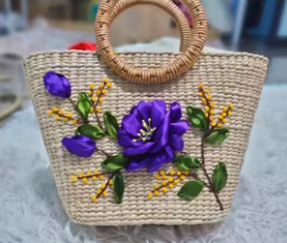
################
True or False?
- The Shinta Mani Foundation works with women in a small village.
- The women get a loan with high interest.
- They use water hyacinth to make eco-friendly bags.
- Water hyacinths grow in the mountains.
- Selling bags helps the women send their children to school.
- The project is bad for the environment.
- The women use traditional weaving skills.
- The bags are weak and break easily.
- Many people who care about nature want to buy the bags.
- The women use the money to fix their homes.
- The project gives the women confidence and independence.
- The bags are made from plastic.
- The women learned weaving skills from their families.
- Buying a bag helps both the women and the planet.
______________
True: 1, 3, 5, 7, 9, 10, 11, 13, 14
#################
Short answers:
- Does the Shinta Mani Foundation help women in a small village?
Yes, it does. - Do the women get a loan with no interest?
_____________ - Do the women make bags from plastic bottles?
_____________ - Does water hyacinth grow in the river?
_____________ - Do the women sell the bags to earn money?
_____________ - Do the women use the money to travel to other countries?
_____________ - Does the project help the women send their children to school?
_____________ - Do the bags hurt the environment?
_____________ - Do the women fix their homes with the money?
_____________ - Does the project give the women more confidence?
_____________ - Do the women get less food because of the project?
_____________ - Do the women stay as a strong group?
_____________ - Does the project make the women work alone?
_____________ - Do the bags help the planet?
_____________
_______________
True: 1, 2, 4, 5, 7, 9, 10, 12, 14
________________
Full version:
Does the Shinta Mani Foundation help women in a small village? — Yes, it does.
Do the women get a loan with no interest? — Yes, they do.
Do the women make bags from plastic bottles? — No, they don’t.
Does water hyacinth grow in the river? — Yes, it does.
Do the women sell the bags to earn money? — Yes, they do.
Do the women use the money to travel to other countries? — No, they don’t.
Does the project help the women send their children to school? — Yes, it does.
Do the bags hurt the environment? — No, they don’t.
Do the women fix their homes with the money? — Yes, they do.
Does the project give the women more confidence? — Yes, it does.
Do the women get less food because of the project? — No, they don’t.
Do the women stay as a strong group? — Yes, they do.
Does the project make the women work alone? — No, it doesn’t.
Do the bags help the planet? — Yes, they do.
#####################
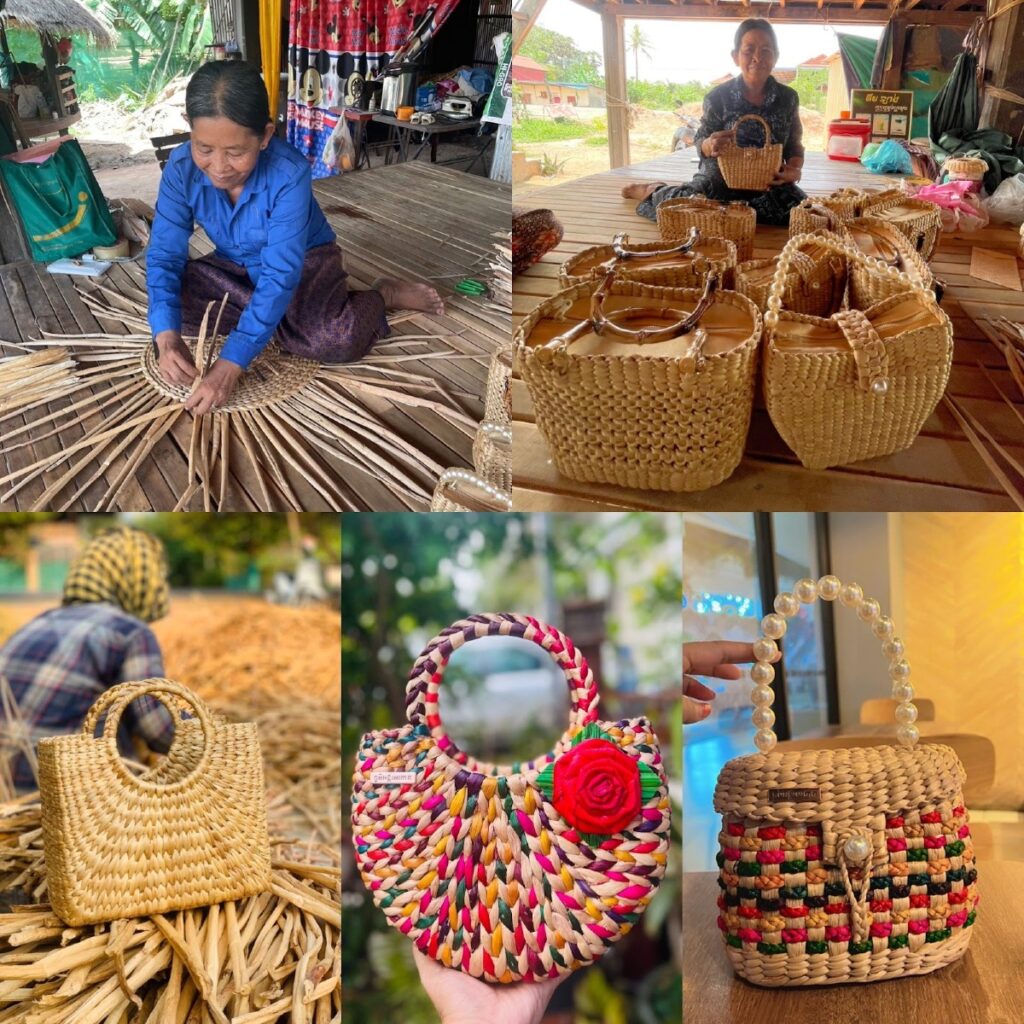
Fill in, words below:
independence – plants – skills – planet – village – Plastic – fix – families – loan – children – supports -eco-friendly
_______________________
- The Shinta Mani Foundation supports women in a small __________.
- The women started a business with a no-interest __________.
- They turn water hyacinth into __________ bags.
- Water hyacinth are __________ that grow in rivers.
- The income helps the women send their __________ to school.
- They can also buy more clothes for their __________.
- The women use traditional weaving __________ to make the bags.
- Selling bags allows the women to _________ and improve their homes.
- The project helps the women gain confidence and ________.
- The group of women stays strong and __________each other.
- __________ bags are bad for the environment.
- The project also helps protect the __________.
____________________________
Full version:
- The Shinta Mani Foundation supports women in a small village.
- The women started a business with a no-interest loan.
- They turn water hyacinth into eco-friendly bags.
- Water hyacinths are plants that grow in rivers.
- The income helps the women send their children to school.
- They can also buy more clothes for their families.
- The women use traditional weaving skills to make the bags.
- Selling bags allows the women to fix and improve their homes.
- The project helps the women gain confidence and independence.
- The group of women stays strong and supports each other.
- Plastic bags are bad for the environment.
- The project also helps protect the planet.
#####################
Complete the story, words below:
weaving – borrow – confidence – eco-friendly – village.- blocks – women – life – sell – loan
________________________
The Shinta Mani Foundation helps women in a small __________.
They want a better __________ for their families.
The Foundation gives them a__________ with no interest.
They __________ money and pay it back later without extra cost.
The women use water hyacinth, a plant that grows too much and __________ rivers.
They make __________ bags from the plant.
They __________ the bags and get money for school, food, doctors, and fixing homes.
They keep their __________ skills from their culture.
The bags are strong and beautiful.
The project helps the __________ and the planet.
It gives them __________ and independenc
___________________
Full version:
The Shinta Mani Foundation helps women in a small village.
They want a better life for their families.
The Foundation gives them a loan with no interest.
They borrow money and pay it back later without extra cost.
The women use water hyacinth, a plant that grows too much and blocks rivers.
They make eco-friendly bags from the plant.
They sell the bags and get money for school, food, doctors, and fixing homes.
They keep their weaving skills from their culture.
The bags are strong and beautiful.
The project helps the women and the planet.
It gives them confidence and independence.